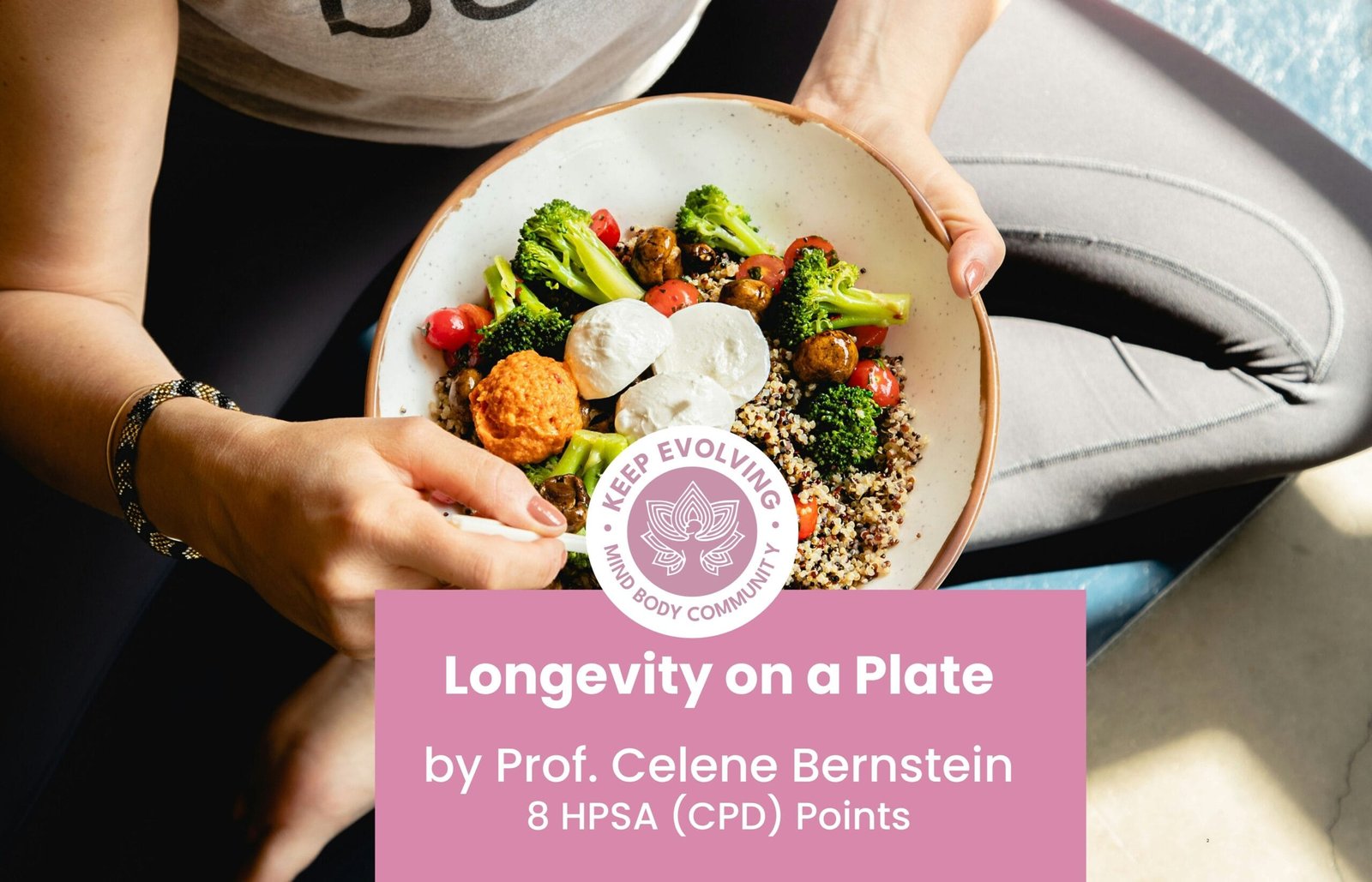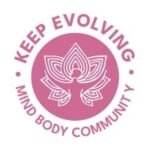Longevity on a Plate

About Course
Longevity on a Plate is an empowering online masterclass created by renowned health expert Prof. Celene Bernstein, who brings over 50 years of experience in nutrition and wellness. Designed for curious, self-motivated individuals, this course offers a practical, science-backed approach to healthy eating and longevity – especially tailored for South Africans seeking to boost their well-being without breaking the bank.
Key Learning Points:
- Optimal Eating for Lifespan: Discover how everyday food choices impact your longevity, vitality, and disease prevention.
- Nutrition Without the Hype: Cut through diet fads with evidence-based insights that go beyond popular media noise.
- Health on a Budget: Learn how to nourish your body effectively using accessible, affordable foods and smart lifestyle strategies.
What Will You Learn?
- In this course, you’ll gain a clear understanding of the difference between longevity and healthspan, and why living longer is only truly meaningful when you’re also living well. You’ll explore how nutrition acts as medicine, influencing your risk of chronic disease, your energy levels, and the body’s ability to repair itself at a cellular level.
- You’ll learn how to support graceful ageing by making simple, evidence-based dietary changes that enhance both physical and cognitive health. The course introduces key strategies such as intermittent fasting, reducing portion sizes, increasing your intake of healthy fats, and limiting processed foods, all aimed at improving vitality and resilience.
- Additionally, you’ll be introduced to the dietary and lifestyle patterns of the world’s longest-living populations, known as the Blue Zones, and discover how to apply these powerful habits in your own life. Finally, you’ll explore the broader lifestyle factors that contribute to longevity—such as movement, social connection, and mindset—offering a truly holistic approach to lifelong health.
Course Content
Module 1: Food for the Ages – Eat to Thrive
This module introduces the key distinction between lifespan and healthspan - emphasising that it’s not just about living longer but living well. Nutrition emerges as a foundational lever to influence ageing, disease prevention, and cellular health. The module explores how diet affects inflammation, mitochondrial health, and chronic disease, and introduces practical strategies such as caloric restriction, low-carb eating, meal timing, and moderated animal protein intake. The science is brought to life through Blue Zones - regions known for high longevity - where commonalities like plant-forward diets, olive oil, legumes, and minimal processed foods define daily life. Longevity is framed as a lifestyle that includes movement, community, and mindfulness, not just dietary choices. The takeaway? Eat less, eat better, and eat with intention.
-
Summary and PDF
-
What is the difference between chronological age and biological age?
Module 2: Principles of Timeless Eating
Here, the focus turns to practical strategies like caloric moderation and intermittent fasting. Concepts such as "Hara Hachi Bu" (eating until 80% full) and time-restricted feeding (like 16:8 fasting) are introduced for their role in supporting metabolic flexibility, lowering inflammation, and encouraging cellular repair. The science of ketosis is unpacked, along with fasting variations suitable for different health goals. Gender-specific nuances are considered, especially for women whose hormonal systems may require modified fasting windows. Nutrient density becomes a key theme, promoting whole foods rich in vitamins, minerals, and antioxidants per calorie. Plant-based eating is advocated not as a rigid rule but as a performance strategy - supporting gut health, lowering inflammation, and improving longevity outcomes. Hydration’s role in cellular efficiency rounds out the toolkit for smarter eating.
-
Summary and PDF
01:58 -
What is caloric moderation, and why is it important for longevity?
Module 3: The Building Blocks of Vitality
This module demystifies macronutrients - carbs, proteins, and fats - and their relationship to energy, repair, and ageing. Carbohydrates are reframed: not all carbs are bad, but refined carbs spike insulin and age you faster. Complex carbs and fibre-rich options (legumes, vegetables) are preferable. Protein is highlighted as the body’s repair crew - essential for muscle retention, immunity, bone density, cognitive clarity, and appetite regulation. Needs increase with age, with suggestions to increase intake to 1.5–2g/kg of body weight. A balance of plant and clean animal sources is ideal. Fats get rehabilitated, with an emphasis on omega-3s and monounsaturated fats (olive oil, avocados, nuts), while processed oils and trans fats are called out as toxic. Fats support hormone production, brain health, skin, and nutrient absorption. The message? Embrace fat - strategically.
-
Summary and PDF
02:40 -
The Building Blocks of Vitality
Module 4: Tiny Heroes, Big Impact – Nature’s Powerhouses
Micronutrients and phytochemicals may be small, but they’re mighty players in the longevity game. This module explores how essential vitamins and minerals (like Vitamin D and Magnesium) are key to bone health, immunity, energy production, and stress reduction. Their synergy - especially how magnesium enables the activation of Vitamin D - is a central insight. Antioxidants such as Vitamin C, E, beta-carotene, selenium, and flavonoids neutralise free radicals that drive cellular ageing and disease. Their food sources - berries, greens, citrus, seeds, and dark chocolate - make for a colourful, disease-fighting diet. Phytochemicals like curcumin (from turmeric) and allicin (from garlic) are presented as natural medicine, with proven anti-inflammatory, heart-protective, and brain-supportive properties. You’re encouraged to eat with the rainbow and embrace spices and herbs not just for flavour but function.
-
Summary and PDF
-
Tiny Heroes, Big Impact
Module 5: Gut Feelings – The Microbiome Revolution
The gut is no longer just a digestive organ - it’s your second brain and immune powerhouse. This module outlines the connection between gut health and systemic wellbeing, including mood, inflammation, metabolism, and immune function. A diverse and balanced gut microbiome is essential for ageing well. Fibre-rich, plant-based diets are microbiome-friendly, while ultra-processed foods and antibiotics are destructive. Key practices include consuming prebiotics (onions, garlic, bananas), probiotics (fermented foods like kefir, sauerkraut, and miso), and postbiotics (the beneficial by-products microbes produce). Gut permeability (“leaky gut”) is explored as a root cause of systemic inflammation and autoimmunity, with steps to heal it through mindful eating, reduced sugar, and gut-soothing nutrients like glutamine. The takeaway: you’re only as healthy as your gut bugs - feed them well.
-
Summary and PDF
-
Gut Feelings
Module 6: The Fire Within – Tackling Inflammation
This module exposes sugar as one of the most powerful accelerators of ageing and inflammation. Excessive sugar intake is linked to chronic conditions like diabetes, cardiovascular disease, Alzheimer’s, and even cancer. You’re shown how sugar disrupts insulin signalling, increases belly fat, fuels oxidative stress, and harms the gut. The module dives into hidden sugar in packaged foods and discusses the addictive cycle it creates, including emotional eating triggers. Practical tips include cutting sugary beverages, choosing natural sweeteners like stevia or monk fruit, and reading labels with a critical eye. The module also discusses how high-glycaemic foods - like white bread or processed cereals - have similar inflammatory impacts. Replacing sugar with protein, fibre, and healthy fats helps stabilise energy and reduce cravings. Cutting sugar isn’t just a diet hack - it’s a brain and body longevity upgrade.
-
Summary and PDF
-
The Fire Within: Tackling Inflammation
Module 7: Secrets of the Centenarians – What We Can Learn from the Blue Zones
Explore the secrets of longevity through the lens of Blue Zones—regions where people live exceptionally long and healthy lives. This module highlights common lifestyle factors such as plant-based diets, moderate red wine intake, strong community ties, and the Mediterranean diet, known for its anti-inflammatory and heart-healthy benefits. Practical insights include swapping butter for olive oil and increasing fish consumption. The module also introduces intermittent fasting and its role in cellular repair through autophagy. Together, these habits form a sustainable roadmap for extending health span and lifespan, offering simple, science-backed strategies to boost vitality and prevent chronic disease.
-
Summary and PDF
-
Secrets of the Centenarians
Module 8: Longevity in Everyday Life – Making Longevity Delicious
Learn practical strategies for applying longevity-focused nutrition through balanced meal planning, smart grocery shopping, and nutrient-preserving cooking techniques. This module introduces the “Rainbow Plate” concept, encouraging variety in colourful plant-based foods to maximise nutrient intake. Smart shopping tips include buying seasonal produce and focusing on whole foods found around the store’s perimeter. Cooking methods like steaming and baking are recommended to retain vitamins and minerals, while ingredients like turmeric offer added anti-inflammatory benefits. By integrating these simple, sustainable habits into daily life, individuals can enhance their health, extend their lifespan, and make nutritious eating both enjoyable and achievable.
-
Summary and PDF
05:05 -
Longevity in Everyday Life
Module 9: Beyond Food – The Bigger Picture
This module highlights how longevity is best achieved through a synergy of nutrition, exercise, stress management, and quality sleep. Moderate activity like walking improves glucose metabolism, cardiovascular health, and emotional well-being, especially when done after meals. Chronic stress elevates cortisol, driving inflammation and disease, but practices like mindfulness and yoga help restore balance. Poor sleep disrupts hunger hormones, increasing cravings for sugar and processed foods. Nutrients like magnesium and tryptophan support restful sleep, while screen-free evenings and consistent bedtimes optimize recovery. Together, these lifestyle habits reinforce each other to promote vitality, resilience, and long-term health beyond diet alone.
-
Summary and PDF
Module 10: Fact or Fiction? What Really Works for Longevity?
Understanding what truly supports longevity requires separating science from hype. Carbohydrates and fats, often misunderstood, are essential when sourced from whole, nutrient-rich foods. Creatine and nootropics like lion’s mane show promise for enhancing brain health and energy beyond traditional uses. Medical weight loss tools such as Ozempic and Metformin may aid those with specific needs but work best alongside sustainable habits like balanced nutrition, regular movement, stress management, and quality sleep. The key to lasting vitality lies in informed, personalised choices—not quick fixes. By focusing on evidence-based strategies, you can support a longer, healthier, and more vibrant life.
-
Summary and PDF
Module 11: Taking the First Step – Your Longevity Action Plan
The final module invites you to consolidate the course into a clear, personal roadmap. You reflect on your values, lifestyle constraints, and motivations, translating theory into practical daily choices. A 7-pillar framework is introduced - covering nutrition, sleep, movement, mindset, stress, relationships, and purpose. You’re guided to assess each area, identify gaps, and prioritise upgrades. Tools like meal planning, journaling, habit stacking, and tracking are offered to support consistency. The module reiterates the importance of progress over perfection and building a system that is sustainable and enjoyable. Ultimately, longevity is not a sprint - it’s a slow, intentional walk toward vitality. The course closes with a call to action: live your years with purpose, protect your energy, and be your own health advocate.
-
Summary and PDF
Student Ratings & Reviews

No Review Yet
